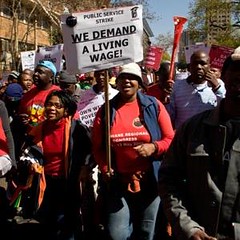
A South African strike by public sector in employees has had a dramatic impact on the country. The workers are demanding a 8.4 percent raise as well as a housing allowance.
Originally uploaded by Pan-African News Wire File Photos
Reuters
JOHANNESBURG. MOST of South Africa’s 1,3 million striking state workers returned to their posts yesterday as union leaders struggled to persuade members to accept a deal that would officially end the labour action.
The gains won by the workers will be totally eroded by the strike needed to win them.
Most workers will not get over the next two years enough extra pay to make up for the pay lost in the strike.
Even if they had won what they wanted, they would still have needed those increases for well over a year to make up for lost pay.
State workers this week suspended a nearly month-long strike that caused chaos in hospitals, closed schools and strained ties between President Jacob Zuma’s ruling African National Congress and its long-standing union allies.
"We are facing a serious backlash from our members who object to the union leadership’s decision to suspend the strike," said a union official who did not want to be named
"Many say we have sold them a dud."
Union leaders have already agreed to the government’s 7,5 percent wage increase and R800 a month for housing but have had problems selling the deal to rank and file who demand 8,6 percent and R1 000 rand for housing.
The government said it cannot afford to pay any more than it has offered and union leaders have said they feel the deal is a reasonable compromise.
Analysts expect the country’s largest labour federation Cosatu, which is in a ruling alliance with the ANC, as having enough power to bring a formal end to the strike before the three-week suspension period for the walk-out ends.
"Historically Cosatu has shown that it has the ability to convince its members and it will be able to sell this deal," said David Silke an independent political analyst.
"This is a political settlement and any deal will have to see Zuma and (Cosatu’s secretary general Zwelinzima) Vavi come out looking good, even if it is not liked by everyone in the unions," he said.
Nomusa Cembi spokeswoman for the biggest state worker union, the South African Democratic Teachers Union, said members were angry about the government’s offer but most of the teachers in the group were back in classrooms.
Union leaders from National Education, Health, and Allied Workers Union, another major group for state workers, were also discussing objections to the offer with members.
Economists believe the labour action has so far cost the economy about R1 billion a day and dampened sentiment about growth prospects for an economy already lagging behind other emerging markets.
Any agreement to end the dispute is likely to swell state spending by at least 1 to 2 percent, forcing the government to find new funds just as it tries to bring down a deficit totalling 6,7 percent of gross domestic product. — Reuters.
No comments:
Post a Comment